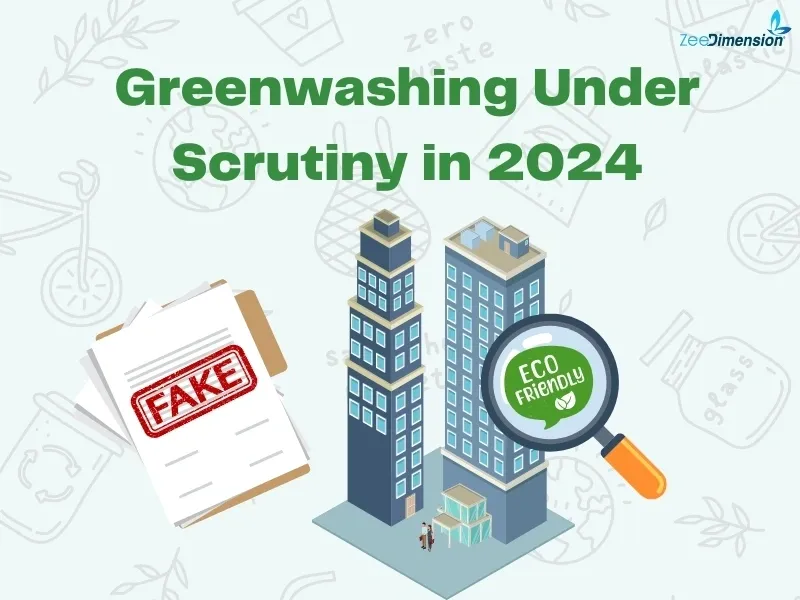
2024 has seen a rise in the scrutiny of “greenwashing,” as environmental advocates, regulators, and consumers demand more transparency in company sustainability claims. The term “greenwashing” describes the practice of businesses misrepresenting or exaggerating the environmental friendliness of their operations or products to capitalize on the rising demand for sustainable business practices. Many businesses are facing criticism for their deceptive marketing as the effects of climate change worsen and public awareness of environmental issues rises. Regulatory agencies are working harder to enforce regulations against misleading environmental claims, demanding more precise criteria and evidence of the benefits to the environment. Consequently, businesses are under pressure to either truly embrace sustainable practices or risk negative publicity and legal repercussions. This article will discuss Greenwashing Under Scrutiny in 2024
What is Greenwashing?
Greenwashing is a misleading marketing strategy where companies claim to be environmentally responsible without substantiating their actions, often using buzzwords like “eco-friendly” or “green” without supporting their claims or highlighting minor environmental improvements. Greenwashing, an unethical practice that misleads customers and undermines sustainable companies, is gaining attention as consumers become more eco-conscious. Activists and regulators are calling for stricter standards and certifications to ensure accurate green claims, reflecting a broader push for accountability and transparency in corporate sustainability efforts.
How to avoid Greenwashing?
To avoid greenwashing, businesses should set clear, measurable, and realistic environmental goals, backed by credible evidence. They should provide specific details about their sustainability initiatives, such as using certified organic materials or implementing renewable energy sources. Certifications from recognized organizations like Fair Trade, Energy Star, or LEED can verify environmental claims and build consumer trust. Moreover, businesses should be transparent about their challenges, admit areas for improvement, and focus on long-term strategies to reduce environmental impact. Clear communication, accountability, and consistent sustainability improvements are key to avoiding greenwashing and building trust.
New Regulations in 2024
The European Union is leading the way with new rules. By 2026, (generic environmental claims) will be banned unless backed by certified evidence. This means companies must provide clear and (verifiable data) on their sustainability efforts. The purpose of this action is to prevent companies from making ambiguous or deceptive claims about their sustainability initiatives, a practice known as “greenwashing.” Businesses will have to give precise information about the environmental advantages of their goods and services, backed up by reliable assessments or third-party certifications. The EU’s regulatory shift aims to increase accountability, encourage businesses to invest in sustainability, and empower consumers to make informed choices. This presents both challenges and opportunities, with the EU’s rules set as a global standard.
Penalties for Greenwashing
Greenwashing penalties are increasing as governments and regulatory bodies tighten oversight, leading to fines, legal actions, and reputational damage for companies. European Union legislation may ban unverified claims and introduce penalties for non-compliance. Social media platforms can significantly impact a brand image, potentially leading to legal consequences and a loss of consumer trust.
Impact on ESG Reporting
Greenwashing undermines ESG reporting credibility by creating misleading images of a company’s sustainability efforts. It distorts ESG metrics, making it difficult for investors, regulators, and consumers to assess impact. It also dilutes ESG investments, making it difficult to differentiate between sustainable businesses. Here are some key ways it affects ESG reporting:
-
Erodes Trust: Greenwashing is when companies provide misleading or false information about their sustainability practices.
-
Distorts Market Perception: Greenwashing is a practice where a company’s environmental and social impact is misrepresented or misrepresented.
-
Regulatory Risks: Greenwashing is a practice where companies are accused of promoting products or services that are not environmentally friendly.
-
Investor Skepticism: Investors’ skepticism about corporate sustainability reporting due to greenwashing can hinder the effectiveness of ESG initiatives and discourage genuine sustainability efforts.
-
Hinders Progress: Greenwashing can hinder the advancement of genuine sustainability initiatives.
7 Ways Can Companies do to avoid greenwashing accusations
Greenwashing accusations can severely impact a company’s reputation and financial standing, causing damage to brand credibility, loss of consumer trust, and increased demand for transparency, potentially leading to immediate financial losses and long-term market harm. To avoid greenwashing, companies can take several proactive steps to ensure their sustainability claims are genuine and transparent:
📷
-
Set Clear and Achievable Goals: Establish measurable sustainability targets, avoid vague claims, and ensure transparency and accountability through detailed reporting.
-
Engage Stakeholders: Engage stakeholders in the sustainability process, regularly communicating progress and challenges to build trust and credibility.
-
Use Standardized Frameworks: The Global Reporting Initiative (GRI), Sustainability Accounting Standards Board (SASB), and Task Force on Climate-related Financial Disclosures (TCFD) are recognized ESG reporting frameworks that offer consistent
-
Focus on Genuine Impact: Focus on initiatives that have a genuine and positive impact on the environment and society,
-
Educate and Train Employees: The company is promoting sustainability by providing comprehensive training to all employees on their roles and responsibilities,
-
Continuous Improvement: The text emphasizes the importance of regularly reviewing and updating sustainability practices to incorporate new insights and technologies.
-
Avoid Misleading Marketing: The company should ensure its marketing materials accurately represent its sustainability efforts
By following these steps, companies can build a genuine and credible sustainability strategy that avoids the pitfalls of greenwashing.
In Conclusion
By 2024, businesses, consumers, and regulators will scrutinize greenwashing more than ever before as they demand greater accountability and transparency from sustainability initiatives. Businesses can no longer rely on ambiguous or deceptive claims to appear eco-friendly in the face of tougher regulations on environmental claims, such as those being put into place by the European Union. This change promotes true corporate responsibility and exposes companies that use dishonest business tactics. 2024 marks a (turning point) for corporate sustainability. Companies must move beyond marketing tricks and embrace (real, accountable change). Is your business ready to meet these new standards?







